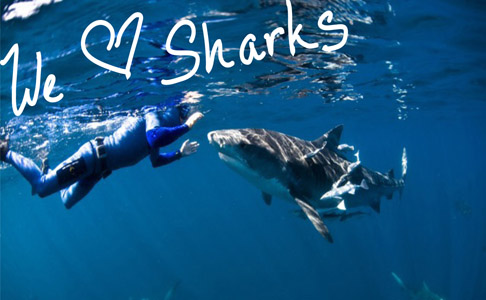If you like to geek out over sharks as much as we do at Aquarium of the Bay, then you probably canít wait for the upcoming Shark Week on the Discovery Channel.

You can choose your own shark adventure this month with events taking place at Aquarium of the Bay and the San Francisco Main Library. Photo courtesy of Aquarium of the Bay
By Mallory Johnson
Published: August, 2013
If you like to geek out over sharks as much as we do at Aquarium of the Bay, then you probably can’t wait for the upcoming Shark Week on the Discovery Channel. A full week of fascinating shark facts, amazing first-hand tales and insanely cool shark footage. Seriously, what’s not to like?
A popular topic during Shark Week is shark attacks. Every year you can tune in to hear people recounting their personal experiences accompanied by graphic reenactments of the incidents. This caused me to consider a common myth surrounding sharks in San Francisco. It appears that many people believe San Francisco Bay is infested with man-eating sharks.
For starters, let’s make something clear: there is no such thing as a man-eating shark. Yes, people have been attacked by sharks, but there is actually a very good explanation for why, on the rare occasion that it happens, a shark will attack a human.
Sharks aren’t out there actively searching for humans to gorge on. As a matter of fact, when a shark does mistake a human for its prey, it will most likely figure out its mistake quite quickly and move on to find something more appetizing. So how do sharks make these mistakes? When looking up from under the surface of the water, sharks can really only see the silhouettes of what’s above. Consequently, the shape of a surfer silhouetted against the water surface can be mistaken for a seal or sea lion, a favorite food of great white sharks—the species most commonly associated with this myth. Being somewhat picky eaters, sharks will typically move on once they realize that they did not bite the mouthwatering blubber-filled pinniped they wanted, which is why most shark attacks end in bites rather than actual fatalities.
If that doesn’t have you convinced, let’s look at some statistics. There are approximately 50-75 shark attacks worldwide each year. Only about five of those attacks actually result in fatalities. Let’s now compare that to the number of annual fatalities due to cigarettes (5 million), road accidents (2.5 million), lightning (10,000) or even hotdogs (70). The odds of being killed by a shark are one in 300,000,000. To put that into perspective, you are 450 times more likely to win an Olympic gold medal, and over 3,000 times more likely to date a supermodel than you are of being killed by a shark. Unsurprisingly, a large portion of this misdirected fear of sharks can be attributed to Jaws novelist Peter Benchley and film director Steven Spielberg—who, to be fair, had no intention of creating such a negative reaction towards the species.
The myth that there are man-eating sharks in the San Francisco Bay, however, can also be attributed to the guards at Alcatraz. They would tell the inmates of the shark-infested waters surrounding the island to deter them from trying to escape. Now, this statement is not totally false—there are quite a few species of shark that inhabit the Bay, including leopard, soup fin and sevengill sharks. However, most of these species are relatively smaller bottom-dwelling sharks that pose no threat to people. Though it’s not unheard of for a great white shark to venture into the Bay from time to time, great whites typically stay in the much deeper waters of the ocean beyond the Golden Gate Bridge, where there is plenty of non-human prey to dine on.
You can learn more about sharks by visiting Aquarium of the Bay for Shark Week, from August 3-11, where there will be special shark presentations all week. You can also join Aquarium of the Bay for a presentation by Jonathan Kathrien, an actual shark attack survivor, who will recount his experience and explain why his attack turned him in to an avid advocate for sharks. For more information, visit www.aquariumofthebay.org.

